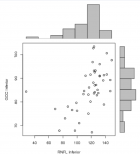Abstract
Opinion
Use of Rivaroxaban and Apixaban, Two Non-Vitamin K Antagonist Oral Anticoagulants (NOACs), in Renally Impaired Patients - the limits of our knowledge
Kenneth T Moore* and Maria Langas
Published: 11 October, 2018 | Volume 3 - Issue 3 | Pages: 049-051
Patients with chronic kidney disease are at increased risk of thromboembolic complications and are therefore often managed with anticoagulation therapy [1]. While these patients are traditionally treated with Vitamin K antagonists (VKAs), the Non-Vitamin K antagonist oral anticoagulants (NOACs), such as rivaroxaban and apixaban are being used with increasing frequency. Relatively new to the anticoagulant treatment arsenal, both compounds are direct Factor Xa inhibitors and represent an alternative to traditional VKA treatments, such as warfarin. However, because these compounds are at least partially renally eliminated, achieving safe and effective anticoagulation in this vulnerable population has proven to be a challenge [2,3]. With limited published data, there is often uncertainty surrounding which of the NOACs can be safely used.
Read Full Article HTML DOI: 10.29328/journal.jccm.1001026 Cite this Article Read Full Article PDF
Keywords:
Renal Impairment; Rivaroxaban; Apixaban
References
- Lutz J, Jurk K, Schinzel H. Direct oral anticoagulants in patients with chronic kidney disease: patient selection and special considerations. Int J Nephrol Renovasc Dis. 2017; 10: 135-143. Ref.: https://goo.gl/MBu8sA
- Xarelto [package insert]. Raritan, NJ. Janssen Pharmaceutical Companies. 2011 (revised October 2017).
- Eliquis [package insert]. Princeton, NJ: Bristol-Myers Squibb Company. 2012 (revised February 2018).
- Patel MR, Mahaffey KW, Garg J, Pan G, Singer DE, et al. Rivaroxaban versus warfarin in nonvalvular atrial fibrillation. N Engl J Med. 2011; 365: 883-891. Ref.: https://goo.gl/JZux9g
- Granger CB, Alexander JH, McMurray JJ, Lopes RD, Hylek EM, et al. Apixaban versus warfarin in patients with atrial fibrillation. N Engl J Med. 2011; 365: 981-992. Ref.: https://goo.gl/vuXaQr
- Connolly SJ, Ezekowitz MD, Yusuf S, Eikelboom J, Oldgren J, et al. Dabigatran versus Warfarin in Patients with Atrial Fibrillation. N Engl J Med. 2009; 361: 1139-1151. Ref.: https://goo.gl/fs8ha2
- Giugliano RP, Ruff CT, Braunwald E, Murphy SA, Wiviott SD, et al. Edoxaban versus Warfarin in Patients with Atrial Fibrillation. N Engl J Med. 2013; 369: 2093-2104. Ref.: https://goo.gl/XXRm3h
- Kubitza D, Becka M, Mueck W, Halabi A, Maatouk H, et al. Effects of renal impairment on the pharmacokinetics, pharmacodynamics and safety of rivaroxaban, an oral, direct factor Xa inhibitor. Br J Clin Pharmacol. 2010; 70: 703-712. Ref.: https://goo.gl/uENJM7
- Chang M, Yu Z, Shenker A, Wang J, Pursley J, et al. Effect of renal impairment on the pharmacokinetics pharmacodynamics, and safety of apixaban. J Clin Pharmacol. 2010; 56: 637-645. Ref.: https://goo.gl/Ukqwgs
- Dias C, Moore KT, Murphy J, Ariyawansa J, Smith W, et al. Pharmacokinetics, pharmacodynamics, and safety of single-dose rivaroxaban in chronic hemodialysis. Am J Nephrol. 2016; 43: 229-236. Ref.: https://goo.gl/2kb1sU
- Wang X, Tirucherai G, Marbury TC, Wang J, Chang M, et al. Pharmacokinetics, pharmacodynamics, and safety of apixaban in subjects with end-stage renal disease on hemodialysis. J Clin Pharmacol. 2016; 56: 628-636. Ref.: https://goo.gl/3Jrgm4
Similar Articles
-
Use of Rivaroxaban and Apixaban, Two Non-Vitamin K Antagonist Oral Anticoagulants (NOACs), in Renally Impaired Patients - the limits of our knowledgeKenneth T Moore*,Maria Langas. Use of Rivaroxaban and Apixaban, Two Non-Vitamin K Antagonist Oral Anticoagulants (NOACs), in Renally Impaired Patients - the limits of our knowledge. . 2018 doi: 10.29328/journal.jccm.1001026; 3: 049-051
Recently Viewed
-
Trends in TeledentistryRudrakshi C*. Trends in Teledentistry. J Clin Adv Dent. 2020: doi: 10.29328/journal.jcad.1001014; 4: 004-005
-
Au26-35: A Special Geometrical Structure of Au33 (D2) Cluster with Highly Occupied - 14 Pairs of Double-State DegeneracyK Vishwanathan*. Au26-35: A Special Geometrical Structure of Au33 (D2) Cluster with Highly Occupied - 14 Pairs of Double-State Degeneracy. Ann Adv Chem. 2022: doi: 10.29328/journal.aac.1001035; 6: 063-080
-
Texture of Thin Films of Aluminum Nitride Produced by Magnetron SputteringStrunin Vladimir Ivanovich,Baranova Larisa Vasilievna*,Baisova Bibigul Tulegenovna. Texture of Thin Films of Aluminum Nitride Produced by Magnetron Sputtering. Int J Phys Res Appl. 2025: doi: 10.29328/journal.ijpra.1001106; 8: 013-016
-
Minimising Carbon Footprint in Anaesthesia PracticeNisha Gandhi and Abinav Sarvesh SPS*. Minimising Carbon Footprint in Anaesthesia Practice. Int J Clin Anesth Res. 2024: doi: 10.29328/journal.ijcar.1001025; 8: 005-007
-
On Friedman equation, quadratic laws and the geometry of our universeS Kalimuthu*. On Friedman equation, quadratic laws and the geometry of our universe. Int J Phys Res Appl. 2021: doi: 10.29328/journal.ijpra.1001041; 4: 048-050
Most Viewed
-
Evaluation of Biostimulants Based on Recovered Protein Hydrolysates from Animal By-products as Plant Growth EnhancersH Pérez-Aguilar*, M Lacruz-Asaro, F Arán-Ais. Evaluation of Biostimulants Based on Recovered Protein Hydrolysates from Animal By-products as Plant Growth Enhancers. J Plant Sci Phytopathol. 2023 doi: 10.29328/journal.jpsp.1001104; 7: 042-047
-
Sinonasal Myxoma Extending into the Orbit in a 4-Year Old: A Case PresentationJulian A Purrinos*, Ramzi Younis. Sinonasal Myxoma Extending into the Orbit in a 4-Year Old: A Case Presentation. Arch Case Rep. 2024 doi: 10.29328/journal.acr.1001099; 8: 075-077
-
Feasibility study of magnetic sensing for detecting single-neuron action potentialsDenis Tonini,Kai Wu,Renata Saha,Jian-Ping Wang*. Feasibility study of magnetic sensing for detecting single-neuron action potentials. Ann Biomed Sci Eng. 2022 doi: 10.29328/journal.abse.1001018; 6: 019-029
-
Pediatric Dysgerminoma: Unveiling a Rare Ovarian TumorFaten Limaiem*, Khalil Saffar, Ahmed Halouani. Pediatric Dysgerminoma: Unveiling a Rare Ovarian Tumor. Arch Case Rep. 2024 doi: 10.29328/journal.acr.1001087; 8: 010-013
-
Physical activity can change the physiological and psychological circumstances during COVID-19 pandemic: A narrative reviewKhashayar Maroufi*. Physical activity can change the physiological and psychological circumstances during COVID-19 pandemic: A narrative review. J Sports Med Ther. 2021 doi: 10.29328/journal.jsmt.1001051; 6: 001-007

HSPI: We're glad you're here. Please click "create a new Query" if you are a new visitor to our website and need further information from us.
If you are already a member of our network and need to keep track of any developments regarding a question you have already submitted, click "take me to my Query."















































































































































